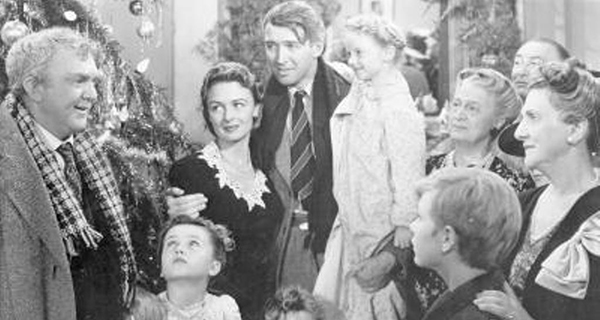 Celebrated American filmmaker Steven Spielberg said, “It’s a Wonderful Life shows that every human being on this Earth matters – and that’s a very powerful message.”
Celebrated American filmmaker Steven Spielberg said, “It’s a Wonderful Life shows that every human being on this Earth matters – and that’s a very powerful message.”
Released in December 1946 (the same month Spielberg was born) and set in the first half of the 20th century, this film has been a Christmas favourite for generations.
George Bailey, the main character, is a talented and ambitious man who, as a result of circumstance, ends up running his family’s business, a small building and loan company in fictitious Bedford Falls, N.Y.
Though George skilfully navigates through the Great Depression, contributes significantly to the prosperity of the middle class in his community, constantly fends off a greedy investor who wants to take control of the town, and is bringing up a beautiful family, he feels his life has been unimportant. When a banking error results in the threat of criminal charges for misappropriation of funds, he’s ready to give up hope.
Just as he’s preparing to jump off a bridge, hoping his life insurance will solve his financial problems, an angel appears and offers to show him what the world would be like had he never been born. Through this experience, George finally becomes aware of the incredible contributions he’s made in the lives of everyone he knows. He’s overwhelmed with a sense of gratitude for a life well lived, despite the fact that he knows he could still end up in jail.
In the end, George’s friends come through for him and disaster is averted. Because the story takes place at Christmas time, the film concludes with George gathered together with his family and friends around a Christmas tree singing Auld Lang Syne. He then receives a gift from his angel with the statement, “Remember, no man is a failure who has friends.”
Perhaps the reason we love this film is that we can all see ourselves in George. We’ve all faced frustrations and have doubted decisions we’ve made. We all, from time to time, have faced despair and asked if the world would be different without us. When George receives his answer, we contemplate our own.
Though it sounds morbid, this is a very life-giving activity. Stephen Covey, in guiding people to make mission statements, will ask them to imagine their own funerals. What do friends, family members and co-workers say about us? What does that tell us about the kind of life we’re living and the legacy we hope to leave behind? If we can answer these questions honestly, we’re able to reach the core of our essence and purpose, and write it on paper.
I recently attended the funeral of a man whom I would call a mentor. He lived a simple life, being best known for running a summer camp with his family for many years. Though my interactions with him had been fewer in recent years, the lessons I learned were never forgotten. Most importantly, he taught me how to live a life of faith and dedication to my own family.
As I listened at the funeral and talked to people at the crowded reception, it was very clear that this wonderful, sometimes gruff and opinionated man had touched the lives of thousands.
The message of It’s a Wonderful Life rings true so many years after it was made because it speaks of powerful universal truths that will never change. We have no idea how the smallest act of kindness impacts the lives of others. We’re born with a purpose – so was every person who walks this beautiful planet with us.
The more we draw out our own good, the more we draw out the good in others and the better the world becomes. It really is a wonderful life.
Troy Media columnist Gerry Chidiac is an award-winning high school teacher specializing in languages, genocide studies and work with at-risk students.
The views, opinions and positions expressed by columnists and contributors are the author’s alone. They do not inherently or expressly reflect the views, opinions and/or positions of our publication.

